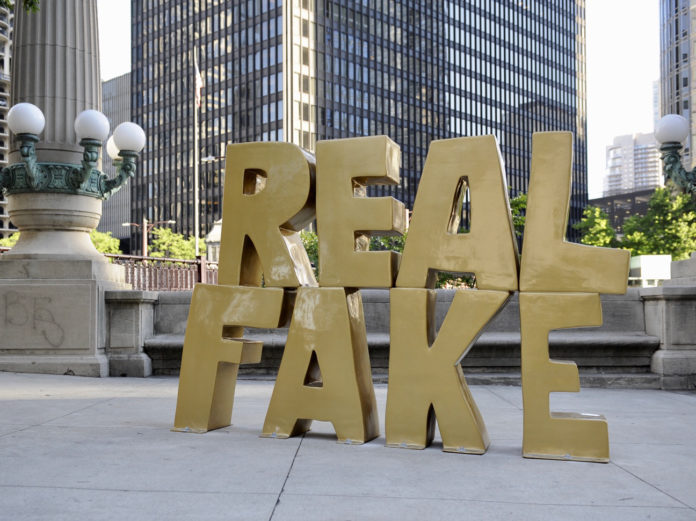
While fake news is often hard to spot, phony advertising, inauthentic companies, and fake people aren’t.
I was listening to my favorite podcast the other day and I heard it. I wasn’t listening for it, but it was obvious. Commercials on podcasts usually involve the host telling you how great a product or service is. It’s typically something they have used personally and they give you their own perspective. It’s almost like an endorsement, so advertisers normally give the host freedom to ad-lib. The result is an advertising segment that seems genuine and authentic.
That’s why it stood out to me when the host of the podcast read this advertisement segment verbatim. It was for the new Toyota CH-R. The ad seemed like it was written by a high-priced Madison Avenue firm. Every word was carefully selected, the message was perfectly crafted, and it was likely focus-tested to provoke a picture-perfect response. The host even read the flawless, well-written legal disclaimer at the end. To me, it sounded phony.
In the podcast world of personal-endorsement-style advertisements, this one felt fake. It didn’t seem truthful or genuine. It was over-produced, over-engineered, and too perfect. It wasn’t real.
“There’s authenticity in a first take.” Mike Rowe
Mike Rowe of Dirty Jobs fame would agree. He made a living off being “authentic.” He said, “Dirty Jobs didn’t resonate because the host was incredibly charming. It wasn’t a hit because it was gross, or irreverent, or funny, or silly, or smart, or terribly clever. Dirty Jobs succeeded because it was authentic.” The show was the first of its kind. There was no script, no rehearsal, and only one take. They turned the cameras on and Mike responded and reacted to his environment. It was genuine and people loved it.
“I believe the enemies of charm are deliberateness in much the same way I would argue that the enemies of authenticity are production.” Mike Rowe
Companies can also be inauthentic when they aren’t true to their message. Think about Subway restaurants. They’ve used the advertising slogan, “Eat Fresh,” since 2002. They came under fire when it was discovered they used azodicarbonamide in their bread as a conditioner. Food blogger Vani Hari, of the popular food blog Food Babe, originally drew public attention to this issue. She revealed that azodicarbonamide was the same chemical used in yoga mats and shoe rubber. In 2014, after public pressure grew, Subway stopped using the chemical in their bread recipes.
But the damage to Subway was done. Subway's sales fell. They lost 3% in 2014, despite opening 778 new stores. They faced eroding public perception regarding the quality of their food while still using the “Eat Fresh” slogan. The main reason they lost consumer confidence was because they were seen as phony and inauthentic. You can’t claim “Eat Fresh” and use a yoga mat chemical in your bread.
People can be fake as well. People who make promises with no intention to keep them, those that make friendships only for personal gain, or those that have hidden agendas are seen as shallow and phony. You can probably name people with these qualities where you work. They can be successful in the short term but only until people learn their true character. Then, no one wants to work with them.
“People with good intentions make promises, but people with good character keep them.” Anonymous
In a world where we are surrounded by phony people and messages, how can we be more authentic? Let me suggest three things.
Be true to the first take. Avoid over-processing and over-engineering your message. A product training video, for example, that has a few mistakes seems more real than one that has been carefully edited. A quick, witty tweet delivered at the right time will get more attention than a perfectly polished post. We are bombarded daily with highly-engineered, focus-group tested messages. An honest first-take is refreshing and seems more authentic.
Be true to your company promise. What does your company stand for? What is the brand promise? Whatever it is, make sure you are delivering to that promise. If you commit to 24 hour deliveries, make sure you are built for speed. If you promise the “lowest prices,” make sure you know that’s true. If you claim “eat fresh,” then know what’s in your recipes. Being true to your brand promise will make you appear more authentic.
Be true to others. Nobody wants a fake friend. Be real. If you make a promise, deliver on it. Build relationships based on mutual respect not hidden agendas and personal gain. Be there for people in the good times as well as the bad. Put others ahead of yourself. Don’t talk behind their backs. Show respect for everyone on your team. Being true to others and being a person of character will make you more authentic.
Let’s get rid of fake news and, while we’re at it, let’s get rid of phony advertising, untruthful companies, and fake people. Authenticity is rare. We will stand out if we embrace reality and stop being so over-engineered on fake. Embrace your genuine self, be original, and see what happens. It certainly worked for Mike Rowe.
What do you think? Does authenticity stand a chance today? Are there other reasons why “Dirty Jobs” had such mass appeal? How can we employ authenticity in our messaging? What are some other examples of authentic or inauthentic companies? What was the result? Let me know in the comment section below.
See more of my articles on business and leadership at jonsrennie.com.





